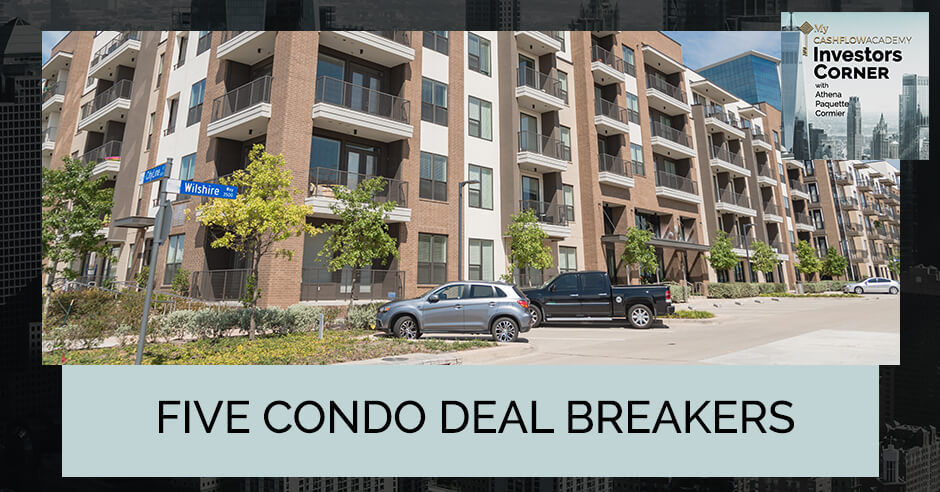
Are you thinking of purchasing a condo but unsure of whether or not it’s the right one for you? What are the red flags you should be aware of when buying a condo? In this episode, Athena Paquette Cormier tackles five deal-breakers that you need to look out for before deciding to buy a condo. Keeping this list in mind will not only help you get approved for a loan more easily, but also avoid running into problems in the future.
—
Watch the episode here:
Listen to the podcast here:
Five Condo Deal Breakers
Too Many Renters
I wanted to share with you the five deal breakers when you’re buying a condo. By deal breakers, I mean facts about a condo that make it hard to finance and that would make you think twice about buying it. The number one deal-breaker is when a condo community has too many renters. What is too many renters? If you have more renters than homeowners, meaning 51% of the occupants are renting the condo from an owner and the owner doesn’t live there. We have trouble getting loans for those. You as a buyer should think about it. Renters don’t care as much as someone who occupies. An owner-occupant would care about maintenance, stability, and respect. It can cause a problem if you have too many renters in a condo community.
Not Enough Cash Reserves
Number two is if the condo doesn’t have enough cash reserves in their account. Keep in mind that a condominium community is a business. You’re buying a home but you’re also buying into a business. Do they run that business efficiently? Do they have enough cash reserves for emergencies, just like your household would? Check if a condo doesn’t have enough cash reserves and a big item comes up that can’t be taken care of with smaller money. If there’s a roof repair or replacement, if there are not enough reserves, they’re going to go to each of the owners and ask for them to pitch in an equal share to cover that. In your larger complexes, a roof could be $50,000 to $100,000. That’s a lot to come up with if you don’t have cash reserves. If the owners are asked to pitch in, they call that a special assessment.
Special Assessments
The number three deal-breaker is if the owners are asked to chip in. It could be as little as $3,000 per owner. I’ve seen many cases where it’s $20,000, $30,000 to $75,000 in special assessments. Let’s suppose you paid $200,000 for your condo years ago and a huge assessment comes up, you may be forced to sell. That’s one side of the two-sided coin. The other side is if you’re the buyer, you’re paying a certain dollar amount for the condo. You have your principal and interest on the loan, taxes, insurance for the inside of the unit if it’s required and the HOA dues. The association is saying, “Not only are you paying association dues, but we need everyone to chip in.” You might think twice about a special assessment that’s $20,000, $30,000, $40,000 because maybe your down payment was smaller than that. If you’re thinking, “I’m going to put $20,000 on a condo and I’m going to owe $30,000 in special assessment,” that might deter you from buying. Even if they offer to finance it, that’s another payment on top of what you were expecting to pay. There’s a matter of qualifying for it. This opens up a bunch of issues when there’s a special assessment. It could work out but you have to take into account the budgetary and monetary burden that that’s putting on you.
Monopolies
Number four is monopolies. I’m calling it monopolies because in lending, we look to see if there’s one individual who owns more than 10% of the complex. Here’s an example from a deal I did. The builder had retained a certain amount of units. This was a 100-unit condominium complex community. The builder had sold most of the units years ago but he had retained twelve of the units. He couldn’t sell them. It was a rough market and he could rent them out. He thought, “I’ve satisfied my construction loan. I’ve sold off. I’ve qualified all these buyers.” He stopped at that point and kept those units.
[bctt tweet=”Conventional lenders do not like to lend on buildings that have construction defects that obviously could get worse.” via=”no”]
Down the road, we have one owner who owns more than 10% of the building. The reason lenders do not like this and something you should think about. If one person owns that many units, they may have undue influence on the voting of the board in making decisions. He’s got ten voting rights. Also, if one person owns that many units and they run into financial problems, they may not pay their association dues. You, as a complex, are now suffering because one individual owed the complex many dollars for all those HOA dues that it brings down the financials for the building. Even though I put it in number four, it’s one of the biggest deal killers.
Lawsuits
Deal killer number five is lawsuits. I’m not talking about trip and fall lawsuits. Mostly, where this comes into play is construction defects that affect the livability of the property. We do see this a lot because a lot of times, construction defects don’t show up for a little bit. The builder is long gone and the association, you as co-owners and group are having to sue the company that built the complex. Number one, lawsuits can take a very long time to go through the courts. Number two, you don’t know what you’re going to be awarded and if it’s going to be enough to fix the problem that exists in the construction of the building. Number three problem is will you be able to collect? Even if you get awarded the amount that’s needed to fix the community, you may not be able to collect it. Lawsuits are a big deal because of the financial burden that’s put on the units and it’s also a big question mark for a long time.
It’s going to be unknown as to whether you’ll get the money and whether the problem can be fixed. Conventional lenders do not like to lend on buildings that have construction defects that could obviously get worse. I picked my top five but there are a number of other problems that I wanted to point out. Deal killers could be a high number of delinquencies. Like I mentioned, possibly the former builder holding onto units, not paying HOA dues for some reason, and collapsing the financials of the association. The high delinquencies of a number of owners could be an issue. Age restrictions, some complexes are like retirement communities. They’re for people over a certain age. Those age restrictions can be a deal killer. Obviously, if you’re not the right age, you won’t get in. The lack of insurance, some complexes are underinsured.
Well maintained and well-run associations will make sure they have enough insurance. Sometimes associations will skimp. They will try and cut down on premiums and the cost of the insurance. That can come to bite you. One of the things that is coming up a lot more and more is that some HOA will bar short-term rentals. Let’s say it’s a condo by the beach or in the desert, that maybe your deal killer if you were planning on renting it out and doing an Airbnb or Vrbo. Instead of renting out the condo for $1,500 a month, you are planning to get $200 a night, that could put a crimp in your plans. Short-term rentals being barred through the associations’ bylaws can kill your deal from that point of view.

There are always ways for me to get you a mortgage on one of these properties if it’s a troubled condo community. However, the interest rate will be higher. Instead of a nice 30-year fixed rate, you’ll get a 3, 5 or 7-year fix that turns into adjustable. We call those hybrid mortgages. You may have to take that until the problem is resolved. As an investor or homeowner, you’re going to want to make sure that the problem can get resolved or else what you bought is what you’re selling. In other words, the problem that exists still exists when you try to go to sell. That’s going to create a problem for you to sell. If you’re going to take on a risk with a condo, make sure you’re getting paid and that you’re getting a good deal on the property. You’re taking on the risk and the possible future problem.
That’s it for my deal killers on condos. Our next topic is going to be the Five Myths of FHA that I’m going to bust. In the next episode of Investor’s Corner, I talked to a nonprofit called Fostering a Change. They’ve built four homes in four years for young adults who are aging out of the foster system and need a place to go. There’s no next step, so they plan to be the next step. They provide housing, support them in getting their schooling done, and getting a good footing to a healthy financial adult future. If you’d like to be added to our mailing list for our free educational events, please text 444999. In the conversation box, put in your email address and then MORTGAGEFUND as a keyword. Thanks for joining me for this episode.
Important Links:
- Five Myths of FHA – Future episode
- Episode – Future episode Fostering a Change

